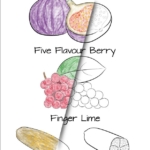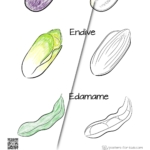Fruits and Vegetables for H
Hala Fruit, Horned Melon, and Husk Tomato are drawn in simple shapes ready for coloring. These drawings are designed to engage the curious minds of toddlers and preschoolers, spark their creativity, and hopefully healthy eating.
And as always, free to download.
Did you know?
Positive Effect on Health: While the Hala fruit may be lesser-known globally, it offers potential health benefits worth exploring. The fruit is a source of dietary fiber, which supports digestive health and helps maintain a feeling of fullness. Additionally, it contains vitamins, including vitamin C, and minerals that contribute to overall well-being. Beyond its nutritional value, the Hala fruit holds cultural significance in various Pacific Island communities, making it not only a flavorful find but also a symbol of tradition and heritage! 🍍😋🌴
Interesting Fact: The Hala fruit, also known as pandanus or screw pine fruit, is a unique and exotic tropical fruit that hails from the Pacific Islands and Southeast Asia. It has a captivating appearance, with a spiky, pineapple-like exterior and a vibrant orange or red hue. The fruit gets its name from the Hala tree, which produces it, and is famous for its unmistakable appearance.
Geographical Origin: The Hala fruit is native to the Pacific Islands and Southeast Asia, where it has been cherished for generations. It’s often associated with traditional cultural practices and ceremonies in these regions.
Positive Effect on Health: Beyond its alien-like appearance, the Horned Melon offers potential health benefits. It’s a source of vitamins like vitamin C, which supports immune health, and vitamin A, which is beneficial for skin and eye health. Additionally, it contains dietary fiber, which aids digestion and helps maintain a feeling of fullness. The exotic and refreshing taste of the Horned Melon, combined with its potential nutritional value, makes it a unique and intriguing addition to your culinary adventures! 🥝😋🌍
Interesting Fact: The Horned Melon, often referred to as the kiwano or African horned cucumber, is a fruit that captivates with its striking appearance. Its spiky, golden-orange skin and vibrant green, jelly-like flesh make it look like something straight out of a sci-fi movie. The horned melon’s flavor is a delightful mix of sweet and mildly tart, with hints of banana, cucumber, and lemon.
Geographical Origin: The Horned Melon is native to the semi-arid regions of Africa, particularly in countries like Kenya and South Africa. It has also gained popularity in other parts of the world, including New Zealand and the United States, where it’s appreciated for its unique taste and visual appeal.
Positive Effect on Health: The Husk Tomato may be small, but it’s big on health benefits. It’s a good source of vitamins, particularly vitamin C, which supports your immune system and skin health. These tiny fruits also contain essential minerals like potassium and phosphorus. In addition to their nutritional value, Husk Tomatoes are known for their antioxidants, which may help protect your cells from oxidative stress. So, when you savor the unique flavor of Husk Tomatoes, you’re not only enjoying a delightful taste experience but also indulging in a fruit that can contribute to your well-being! 🍅😋🌿
Interesting Fact: The Husk Tomato, scientifically known as Physalis, is a small fruit hidden within a delicate papery husk. This charming fruit, often referred to as the “cape gooseberry” or “ground cherry,” offers a tantalizing taste that strikes a delightful balance between sweet and tart. The husk tomato’s unique presentation adds an element of mystery and excitement to your culinary explorations.
Geographical Origin: Husk Tomatoes are native to the Americas, with a history dating back thousands of years. They’ve been cultivated by various indigenous cultures across North and South America, and today, they’re enjoyed in many parts of the world.







